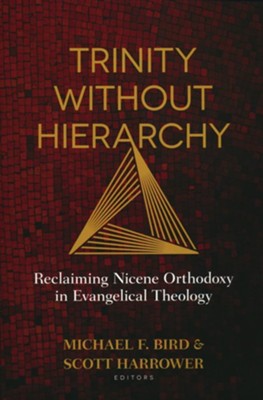There are three cool books on Trinity and the subordination debate now out or about to come out.
 First, Michael F. Bird and Scott Harrower (eds.), Trinity without Hierarchy: Reclaiming Nicene Orthodoxy in Evangelical Theology (Grand Rapids, MI: Kregel, 2019).
First, Michael F. Bird and Scott Harrower (eds.), Trinity without Hierarchy: Reclaiming Nicene Orthodoxy in Evangelical Theology (Grand Rapids, MI: Kregel, 2019).
A collection of essays on the Trinity, subordination, and Nicene Orthodoxy, with some close interaction with advocates of EFS/ERAS, a very diverse cast of contributors. Surveying Scripture, church history, and theology, sixteen contributors present a defense of the full and equal authority of all three members of the Trinity while critiquing approaches that border on semi-Arianism. I’m biased, but I think this will be one of the best books on the subject to date.
 Second, Keith Whitefield (ed.), Trinitarian Theology: Theological Models and Doctrinal Application (Nashville, TN: B&H, 2019).
Second, Keith Whitefield (ed.), Trinitarian Theology: Theological Models and Doctrinal Application (Nashville, TN: B&H, 2019).
In my blurb for this book, I say: “This is a much needed book by Southern Baptists on how to be trinitarian and what are the implications of the Trinity for human relationships. This is a robust conversation among leading Southern Baptist theologians on whether there is any eternal submission/subordination between the divine persons and to what extent husband and wife are an analogy for trinitarian relations. A must-read for anyone interested in trinitarian theology and what it means to call a doctrine ‘biblical.”
 Third, D. Glenn Butner Jr., The Son Who Learned Obedience: A Theological Case Against the Eternal Submission of the Son (Eugene, OR: Pickwick, 2018).
Third, D. Glenn Butner Jr., The Son Who Learned Obedience: A Theological Case Against the Eternal Submission of the Son (Eugene, OR: Pickwick, 2018).
This book offers a fresh perspective on the ongoing evangelical debate concerning whether the Son eternally submits to the Father. Beginning with the pro-Nicene account of will being a property of the single divine nature, Glenn Butner explores how language of eternal submission requires a modification of the classical theology of the divine will. This modification has problematic consequences for Christology, various atonement theories, and the doctrine of God, because as historically developed these doctrines shared the pro-Nicene assumption of a single divine will. This new angle on an old debate challenges the reader to move beyond the inaccurate characterization of views on eternal submission as “Arian” or “feminist” toward a more accurate understanding of the real theological issues at stake. See the interview with Butner on MOS and Church Grammar.











